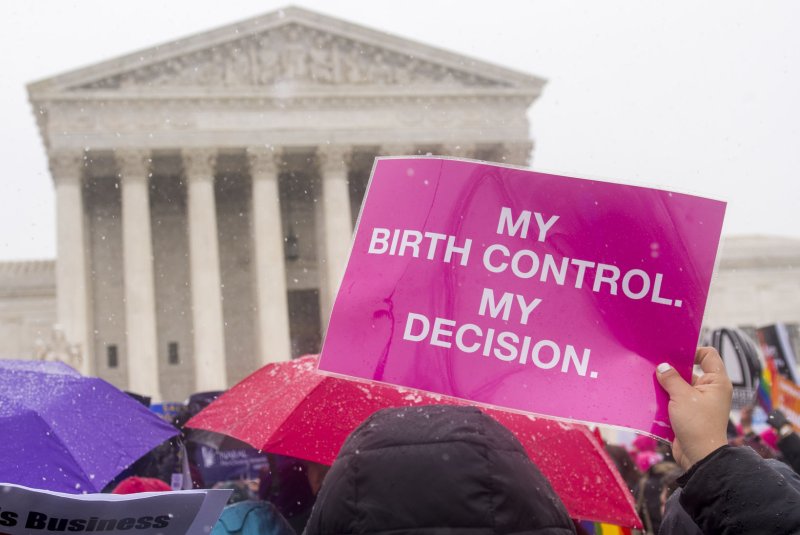Women's rights supporters participate in a rally in front of the Supreme Court as the Court considers two cases brought by Hobby Lobby and Conestoga Wood involving religious objections to the birth control mandate in the Affordable Care Act, in Washington, D.C. on March 25, 2014. UPI/Kevin Dietsch |
License Photo
WASHINGTON, July 15 (UPI) -- Democrats are pushing forward this week with an effort to reverse the Supreme Court decision allowing certain corporations to refuse to provide contraception coverage to employees.
Both the House and Senate will take up procedural votes for a pair of identical bills, dubbed the "Not My Boss's Business Act", that they say will correct the court's misinterpretation of the 1993 Religious Freedom Restoration Act in its Hobby Lobby decision last month.
On Monday, Senate Majority Leader Harry Reid filed for cloture on the bill, clearing it for the first procedural vote set for Wednesday. Although the bill has 43 co-sponsors, not a single Republican has signed on to support the bill, meaning it will almost certainly fail to get the 60 votes necessary to be taken up for final passage.
House Democrats on Tuesday said they also planned to put up a procedural vote on the bill Wednesday, although it is also destined to fail in the Republican-controlled chamber, despite its 147 co-sponsors.
"What the Supreme Court did was a travesty," said Rep. Jerrold Nadler, D-N.Y., one of the chief sponsors of the RFRA.
"We wrote that act to protect people's individual religious beliefs from being imposed upon," he said. "We wrote that bill to be a shield to protect your personal religious beliefs, not a sword to enable you to impose your religious beliefs on someone else."
Republicans have opposed the bill, accusing Democrats of trying to restrict religious freedom.
On the Senate floor Tuesday, Minority Leader Mitch McConnell, R-Ky., announced legislation that would prevent employers from accessing FDA-approved contraception.
"There's no disagreement on that fundamental point, the American people know that," he said. "They know Democrats are just attempting to offer another false choice here. What we're saying is that of course you can support both religious freedom and access to contraception."
But Rep. Louise Slaughter, D-N.Y., a principle sponsor of the House bill, dismissed McConnell's gesture as a "pretty strange" attempt at trying to reframe his party's position as pro-woman.
"Senator, that's the law right now," Slaughter said, pointing out that while under Hobby Lobby, women can still get their contraception, but would have to pay for it out of pocket.
Regular birth control pills, even with insurance, can cost several hundred dollars a year, while an intrauterine device, or IUD, can cost more than $1,000. Under the Affordable Care Act, insurance plans must provide women with contraception at no additional cost, classifying it as preventative care.
"We want it to be a deductible like Viagra has been since its inception," Slaughter said.
The bill, as written, would restrict the RFRA so that it could not be applied to for-profit companies for healthcare services for federally mandated health services. Religious non-profits, such as churches, would remain exempt.
"Women should call the shots when it comes to their healthcare decisions," said Sen. Patty Murray, the Senate bill's sponsor. "Not their bosses. Not their government. Not the Supreme Court."















